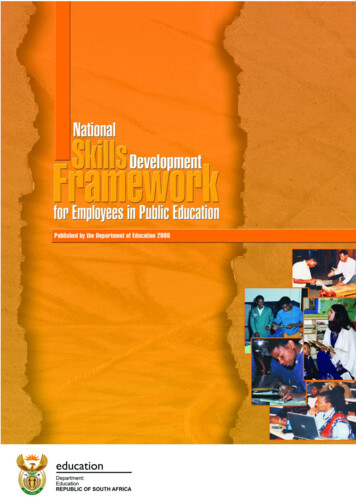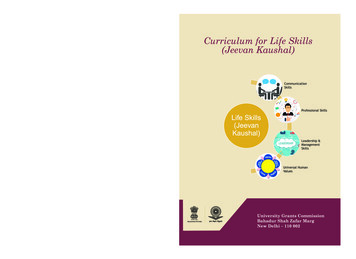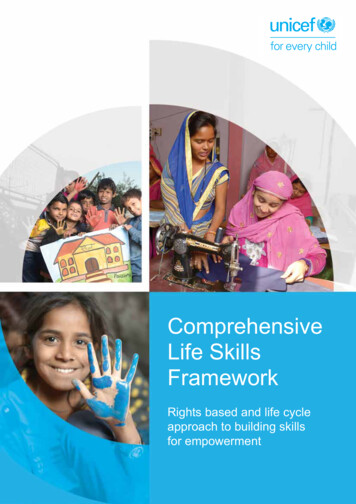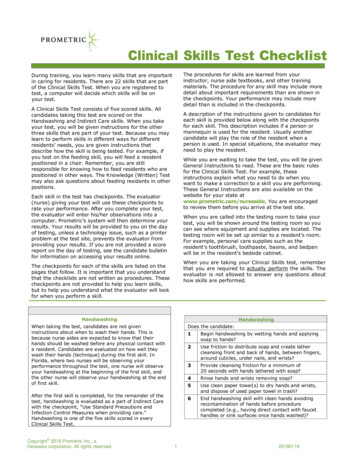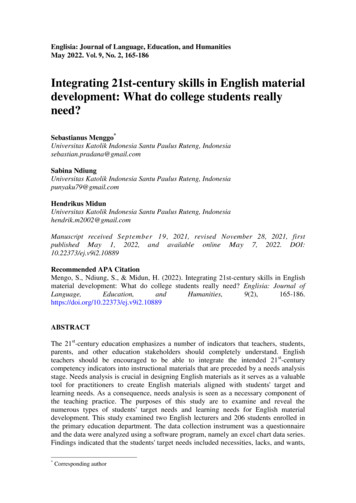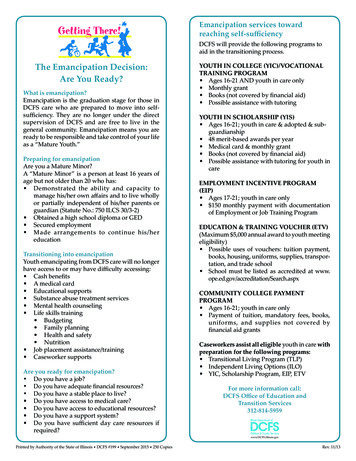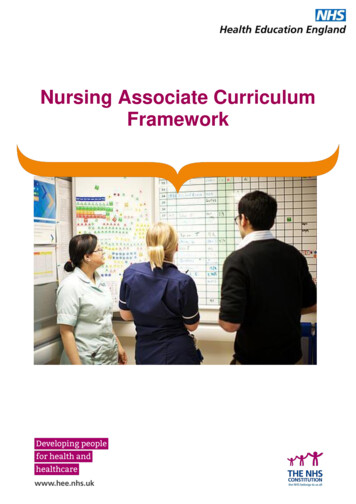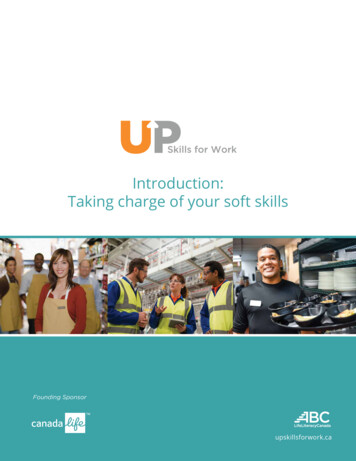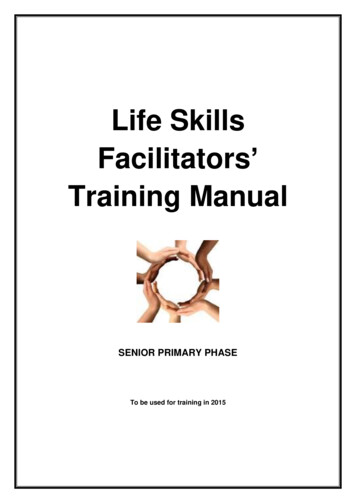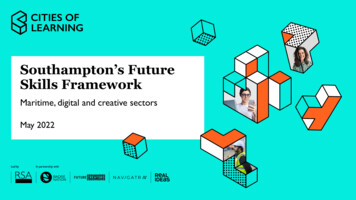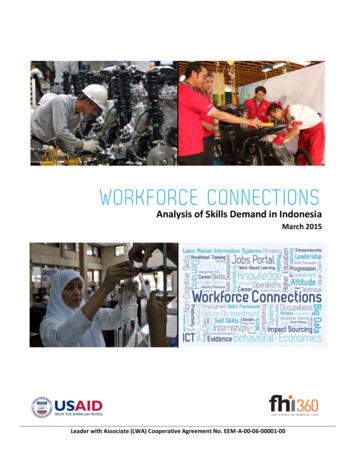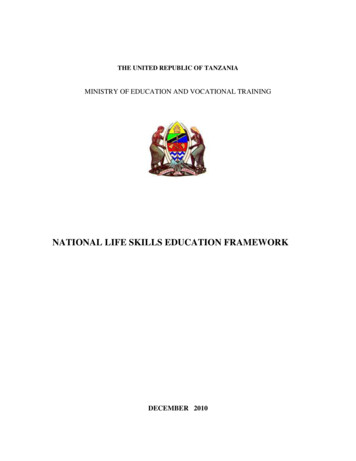
Transcription
THE UNITED REPUBLIC OF TANZANIAMINISTRY OF EDUCATION AND VOCATIONAL TRAININGNATIONAL LIFE SKILLS EDUCATION FRAMEWORKDECEMBER 2010
Table of ContentsTable of Contents . iForeword . iiiAcknowledgements . ivEXECUTIVE SUMMARY . vAcronyms . vii1.0. INTRODUCTION. 11.1. The evolution of life skills as a strategic response in Tanzania . 11.2. Linkage of NLSEF and other key on-going MOEVT initiatives . 21.3. The process leading to the finalisation of the framework . 21.4. Persons and institutions involved in the consultation process . 31.5. Methodology employed for developing the framework . 31.6. The structure of this report . 3SECTION A: . 52.0. BRIEF OVERVIEW OF LIFE SKILLS . 52.1. The origins of life skills . 52.2. Definition of life skills . 52.3. Classification of Life Skills . 62.3.1. Skills of knowing oneself (self awareness) . 62.3.2. Relationship or social skills . 62.3.3. Cognitive skills . 62.4. The importance of life skills . 6SECTION B:. 83.0. LIFE SKILLS IN TANZANIA . 83.1. Background . 83.2. The current situation . 83.2.1. Understanding of life skills . 93.2.2. Life skills curricula and materials . 93.2.3. Guidelines from the MoEVT . 93.2.4. Life skills for the „out of school‟ . 103.2.5. Peer education . 10SECTION C: . 124.0. KEY ISSUES REFLECTED IN THE FRAMEWORK . 124.1. Major debates . 124.1.1. Place in the school curriculum . 124.1.2. Curriculum Focus: HIV exclusive or HIV sensitive? . 124.1.3. Starting age: when to begin? . 134.1.4. To examine or not to examine? . 134.1.5. Teacher training . 134.1.6. External support to teachers for life skills education . 14SECTION D: . 155.0. THE GOAL, STRATEGIES, RISKS AND ASSUMPTIONS . 155.1. The Goal. 155.1.1. Outcome 1 . 155.1.2. Strategy . 155.1.3. Outputs for Outcome 1: . 15i
5.2. Outcome 2 . 165.2.1. Strategy . 165.3.1. Outcome 3: . 165.3.1. Strategy . 165.3.2. Outputs for Outcome 3: . 165.4. Out come 4 . 175.4.1. Strategy . 175.4.2. Outputs for Outcome 4: . 175.5.4. Key risks and assumptions . 17SECTION E:. 196.0. INSTITUTIONAL ROLES AND RESPONSIBILITIES . 196.1. Responsibilities, accountabilities and partnerships. 196.2. Coordination Mechanisms for NLSEF . 206.2.1. National Level Co-ordination . 206.2.2. Regional and District Level Co-ordination . 206.2.3. Ward and Community Level Co-ordination . 21SECTION F: . 227.0. THE MONITORING AND EVALUATION COMPONENT . 227.1. Overview . 227.2. Setting up a life skills system. 227.2.1. Key activities. 227.3. Quality of the System. 237.4. Preparation . 237.5. Materials production . 237.6. Nature of the Methodology . 247.7. User and client satisfaction . 247.8. Teacher training . 247.9. Quality of the school environment . 247.10. Protective environment . 247.11. Participatory environment (child friendly schools) . 247.12. Setting up a life skills system out of school . 247.13. Outcome indicators . 257.14. Use of proxy indicators . 267.15. Role of the inspectorate . 267.16. Monitoring of out of school programmes . 267.17. Evaluation of the impact of life skills education . 26SUMMARY OF THE IMMEDIATE WAY FORWARD . 28Annex 1: Log Frame Matrix for NLSEF . 30Annex 2: Monitoring and Evaluation Framework . 50Annex 3: Roles and Responsibilities. 58Bibliography . 64ii
ForewordThe National Life Skills Education Framework (NLSEF) is a comprehensive document.It encompasses children and youth and it addresses issues for those in school as well asout-of -school. It takes into account the needs and attitudes of the people of Tanzania,and incorporates ideas from external best practices in the region and elsewhere.The NLSEF serves as a critical reference point for a variety of key actors who will takethe process forward and ensure that the framework is translated into practical plans andactions to address life skills education in Tanzania. The roles and responsibilities of thesedifferent actors are spelt out in this framework.The implementation of this framework will ensure that children and youth are betterequipped to respond to the challenges of the modern world. The challenges include risksto their health, infection from HIV and other diseases, as well as early pregnancies. It willalso ensure that they are better equipped knowledge and skills to participate actively asTanzanian citizens from both political and livelihood perspectives.This framework reflects other key national initiatives, including: the Basic Standards forPre Primary and Primary Education; the Education Training Policy; Education SectorDevelopment Programme and sub-sector programmes. The NLSEF is also reflected insub-national plans at the council, ward and community/school levels and in the strategicplans of other key ministries, the Ministry of Labour Employment and Development,Ministry of Health and Social Welfare, Ministry of Information, Youth, Culture andSports.Commissioner for Educationiii
AcknowledgementsThe Ministry would like to acknowledge all the effort that went into the consultationprocess leading to the development of the previous consultation report and subsequentlythis National Life-Skills Education Framework. This involved the consultant RichardMabala, officials in MoEVT Headquarters and the Tanzania Institute of Education, aswell as tutors from Morogoro Teachers‟ College, education officers in Mbeya, Iringa andMwanza regions, primary and secondary school teachers from Dar es Salaam, Pwani,Mbeya, Iringa and Mwanza regions and pupils from the same regions at both primary andsecondary levels. Officials from the MIYCS, the MoHSW and officials from TACAIDSand NACP.Acknowledgments also go to the United Nations Country team responsible for life skillswhich included UNICEF, UNFPA and UNESCO, and organisations which are involvedin HIV prevention and life skills education. These included PASHA, LISA, FEMINA,TAMASHA, FHI, Peace Corps, CCBRT and VSO in Dar es Salaam, as well as SPW inIringa and Mbeya, the former GTZ project in Mbeya, Tumaini University, Umati,AMREF and Ilula orphan programme in Iringa, TANESA, Kivulini, Mema kwa Vijana,Adilisha and the Magu out of school programme in Mwanza.We are also grateful to the UNICEF Tanzania country office, for funding and providingtechnical assistance for the development of the National Life Skills Framework.iv
EXECUTIVE SUMMARYThe development of a National Life Skills Education Framework (NLSEF) took place atan opportune moment in Tanzanian education. This framework, links closely withnational strategies and initiatives in the education sector to improve the overall wellbeing and learning outcomes for all Tanzanian children and youth. These strategiesinclude: MoEVT HIV and AIDS Strategic plan, the In-Service Training Strategy, BasicStandards for Pre-primary and Primary Education in Tanzania and National Strategy forCare and Support Services in Primary Schools in Tanzania.The NLSEF is the result of extensive consultations which have lead to a broad consensuson the best way forward for teaching Life Skills Education in Tanzania. It sets forth anoutline on which all stakeholders should adhere to in implementing life skills for both inand out of school children and youthThe framework is premised on theories about the way children and youth grow, learn andbehave. It sees the acquisition of life skills as a social development process that canbecome a means of empowerment for children and youths, especially as they mature intoadulthood. The framework defines life skills basing on theories and actual programmesthat have been developed in-country and in different parts of the world in order toencapsulate best practise for teaching life skills education in Tanzania. It highlights thenecessity of life skills education in Tanzania. The framework recommends a collaborativeapproach to life skills delivery, building on formal policy statements and a multitude ofinitiatives for both children and youth in and out of school which have placed anemphasis on life skills since the 1990‟s.Life Skills in Tanzania are currently part of the school curriculum; Emphasis on life skillswas stressed during the HIV and AIDS era to enable the children and youth to preventthemselves. This framework sets out to promote a holistic approach to life skillseducation that includes skills of knowing oneself (self awareness), Relationship skills,Cognitive skills and Sexual Reproductive Health (SRH) education.For the out of school youth, the framework recognises the advances made by the MIYCSwhich has life skills as a key part of all its youth programmes and has been developing itsown framework to enhance that affect. The NLSEF puts forward the need to harmonisethe Education Framework with the MIYCS framework in order to promote coherence inthe holistic approach to life skills education for all children and youth in Tanzania. TheMOEVT already has successful programmes to build on such as the ComplementaryBasic Education in Tanzania (COBET) initiative and also successful programmes byNon-governmental Organisations (NGOs) involved in life skills education for the out ofschool youth in Tanzania.The framework acknowledges the key role that teachers and other facilitators play as theprimary means to develop life skills education in children and youth. In particular itrecognises Teacher Education including Pre-service and In-service Training as a keyv
entry points for life skills pedagogy. Apart from the important role teachers play indeveloping life skills to children and youth, peer Education is another main strategy thatcan be used to develop life skills among learners.The overall goal of NLSF is to ensure that: “All children and young people in Tanzaniaare provided with quality life skills education and utilise the life skills in an environmentwhich encourages and enables them to do so for their own benefit and for the benefit oftheir society, with particular emphasis on adopting attitudes and practices that protectthem against HIV infection”.To attain the above goal this document includes logical framework matrix which clearlyshows objectives, strategies, Verifiable indicators Means of Verification, responsibleagencies and risks and assumptions.vi
AcronymsAIDS:AMREF:COBET:CSO:DCC D:MoEVT:MoHSWNECTA:NMSF:NCC LSE:NLSEF:PAHO:PASHAPEDP:PRS:RCC DC:WHO:YSO:Acquired Immune Deficiency SyndromeAfrican Medical Research FoundationComplementary Basic Education TanzaniaCivil Society OrganisationDistrict Coordinating Committee for Life Skills EducationElimu Dhidi ya UKIMWI (HIV Prevention Education)Family Health InternationalGerman Technical Co-operationHuman Immuno Deficiency SyndromeInstitute of Adult EducationIn Service Training of TeachersLife Skills Association of TanzaniaLife Skills Based EducationMpango wa Kukuza Uchumi na Kupunguza UmaskiniMinistry of Labour, Employment and Youth DevelopmentMinistry of Education and Vocational TrainingMinistry of Health and Social WelfareNational Examinations Council of TanzaniaNational Multi Sectoral FrameworkNational Coordinating Committee for Life Skills EducaionNational Life Skills Education FrameworkPan American Health OrganisationPrimary Education Development ProgrammePoverty Reduction StrategyRegional Coordinating Committee for Life Skills EducationSecondary Education Development ProgrammeStudents Partnership WorldwideSexual and Reproductive HealthSexually Transmitted InfectionTanzania-Netherlands Project to Support AIDS Control in MwanzaTanzania Institute of EducationUnited Nations Education, Social and Cultural OrganisationUnited Nations Children‟s FundVoluntary Counselling and TestingWard Development CommitteeWorld Health OrganisationYouth Serving Organisationvii
1.0.INTRODUCTION1.1.The evolution of life skills as a strategic response in TanzaniaThe process of developing a National Life Skills Framework for Tanzania beganback in 2007 in response to government recognition that life skills in Tanzania isan important strategy in HIV prevention. The second National MultisectoralStrategic Framework (NMSF 2008 to 2012) indeed emphasises that:Empowering young people with knowledge and skills to dialogue about sexuality,to adopt attitudes and practices that protect them against HIV infection and toaccess reproductive health services has been identified as one of the keystrategies in reducing new infectionsThe education targets of Tanzania‟s Poverty Reduction Strategy (MKUKUTA)therefore also include:Effective HIV and AIDS education, environment and life skills programmesoffered in primary schools, secondary schools and teachers’ collegesThe emphasis on life skills is comparatively new and emerged largely as astrategy to combat HIV and AIDS. Life skills education did not feature well inthe National AIDS Policy of 2001, which focused on a knowledge transmissionmodel for the provision of information for children and young people; both the inand out of school. It was only in the second National Multi-sectoral StrategicFramework (NMSF 2008 to 2012) that emphasis was placed on both knowledgeand skills as expressed in the quotation above.This same progression was reflected in the development plans for primaryeducation which includes the provision of life skills based education as one of itsHIV and AIDS education strategies. SEDP still does not explicitly mention lifeskills, although it does have HIV prevention as one of its cross cutting objectives.While the primary reason for the emergence of life skills as an important strategyfor young people to find more effective means of HIV prevention education, lifeskills have also been recognised as a key response to other challenges, includingother preventive behaviours such as resistance to the temptations of drugs andalcohol, but also to include livelihood skills, including entrepreneurship, as suchskills lead to meaningful livelihoods. Thus, MKUKUTA links life skills tolivelihoods and entrepreneurship for rural populations, a fact which is alsorecognised in the Adult Education Non Formal Education Programme; one ofwhose objectives is to develop life skills for livelihood, employment andcommunity development. Unlike the mainstream formal response the NFEprogramme paid specific attention to life skills at an early stage. Life skills havebeen linked to education for citizenship, as citizens with effective life skills arekey to a functioning democratic system.1
These formal policy statements build on a multitude of initiatives for both in andout of school which have placed an emphasis on life skills since the 1990s.However, these initiatives have been hampered by the lack of a comprehensive,national framework for life skills education which has resulted in a fragmented,piecemeal approach: One of the consequences is that HIV/AIDS education is notyet having the impact it should have; another is that other areas of life-skills arerelatively neglected. Indeed there is still insufficient consensus on what is actuallymeant by „life skills education‟ and how it should be taught. However, thisframework is based on extensive consultations which have lead to a new broadconsensus on the best way forward in the medium term in Tanzania.1.2.Linkage of NLSEF and other key on-going MOEVT initiativesThe NLSEF will be a key contribution to the new National HIV/AIDS Strategy,which is due for review, as it will also be to the new National Strategy for theCare and Support of Most Vulnerable Children. The former will focus on courseof prevention, while the latter focuses on mitigation strategies. The NLSEF willalso inform the new National Standards for primary Education in Tanzania andhelp inform the review of the inspection tools. It will have implications for theelaboration of the Teacher Development Management Strategy (TDMS) and forstrategic planning at the national district and sub-district levels, including schooldevelopment planning. It will also inform the review of the Education andTraining Policy and will ultimately have implications for the reform of educationassessment to ensure that assessment becomes more focused on key competencesand skills and not just content knowledge. Not least it will help inform thedevelopment of programmes for children and young people, their teachers andfacilitators.1.3.The process leading to the finalisation of the frameworkThis document is the culmination of an extensive consultative process withinTanzania which commenced in 2007 and culminated in a separate complementarydocument; “The Development of a National Life Skills Framework: Literaturereview and Stakeholders‟ Consultations Report‟. In order to develop theframework a consultant was given the task of carrying out a thorough review ofthe current status of Life Skills Education in Tanzania in terms of achievements,challenges and lessons learned. This thorough review was the basis for thisNational Life Skills Framework for in and out of school youth.The review of the current status of life skills education in Tanzania also reportedon the views of as many stakeholders as possible. This was combined with aliterature review, which included the theoretical background to life skillsprogrammes as well as research into the practice of life skills education inTanzania in terms of curricula, programmes, materials, institutional roles andresponsibilities and suggested ways forward.2
1.4.Persons and institutions involved in the consultation processPersons consulted included key officials in MoEVT Headquarters and theTanzania Institute of Education, as well as tutors from Morogoro Teachers‟College, education officers in Mbeya, Iringa and Mwanza regions, primary andsecondary school teachers from Dar es Salaam, Coast, Mbeya, Iringa and Mwanzaregions and pupils from the same regions at both primary and secondary level.Officials from the MLEYD and the MoHSW were also consulted as well asTACAIDS and NACP. In addition, discussions were held with the UN Countryteam responsible for life skills which included UNICEF, UNFPA and UNESCO,and with as many organisations as possible which are involved in HIV preventionand life skills education. These included PASHA, LISA, FEMINA, TAMASHA,FHI, Peace Corps, CCBRT and VSO in Dar es Salaam, as well as SPW in Iringaand Mbeya, the former GTZ project in Mbeya, Tumaini University, Umati,AMREF and Ilula orphan programme in Iringa, TANESA, Kivulini, Mema kwaVijana, Adilisha and the Magu out of school programme in Mwanza.The consultations were supplemented by a visit of the Life Skills Task Team toNamibia which built on previous study tours to Zimbabwe and Malawi. Asummary of the visit of the Team to Namibia can be found in Annex A of theStakeholder Consultation Report.1.5.Methodology employed for developing the frameworkThe principal methodologies for gathering stakeholder views consisted of apreliminary five day workshop with key MoEVT stakeholders, followed byinterviews with officials of MoEVT in Mwanza, Iringa and Mbeya regions as wellas officials from MoHSW and MLEYD and representatives of the national andinternational organisations mentioned above. These were supplemented by focusgroup discussions with teachers and pupils in primary and secondary schools inthe three regions mentioned together with Dar es Salaam, as well as the out ofschool programme in Magu. Existing syllabi for preschool, primary andsecondary schools and teacher training were also critiqued, together with a broadrange of materials produced for these syllabi1. In addition, the materialsdeveloped by different organisations were analysed, including those of PASHA,LISA, SPW, Peace Corps and FHI, together with the materials produced byFemina including Watoto Bomba and the text books produced by Femina inconjunction with the Zanzibar Ministry of Education.1.6.The structure of this reportThe remainder of this report is divided into five main sections.Section A provides a very brief overview of the global context and theoreticalunderpinning for life skills education. More detailed information is found in thestakeholder consultation document discussed above.Section B briefly reviews the situation in Tanzania1For a matrix summarising all the materials studied, see Annex B3
Section C summarises the main areas of contention for developing the NLSEF, capturingthe fact that there is a wide diversity of views on best approaches.Section D provides a narrative overview of the key results and strategies, as well as thoserisks and assumptions that will have to be addressed if the NLSEF is to guide theeffective implementation of life skills education.Section E provides an overview of institutional arrangements required for the effectiveco-ordination, monitoring and evaluation of the NLSEF.Sections D and E are supported by three key annexes, which are critical referencedocuments to guide the implementation of the NLSEF in future.These are:Annex 1: Logframe for NLSEFAnnex 2: Monitoring and evaluation frameworkAnnex 3: Roles and responsibilities4
SECTION A:2.0.BRIEF OVERVIEW OF LIFE SKILLS2.1.The origins of life skillsThe life skills approach has grown out of and is based on theories about the wayhuman beings, particularly children and adolescents, grow, learn and behave.Some focus more on behavioural outcomes, justifying skills development as away to direct adolescents towards the behaviours that developmental expectations,cultural context and social norms find appropriate. Others focus more on theacquisition of skills as the goal itself, since competency in problem-solving,interpersonal communication and resolving conflicts can be seen as crucialelements of healthy human development. Finally, some theoretical perspectivesview life skills as a way for adolescents to actively participate in their ownprocess of development and the process of constructing social norms. By teachingyoung people how to think rather than what to think, by providing them with thetools for solving problems, making decisions and managing emotions, and byengaging them through participative methodologies, skills development canbecome a means of empowerment.2.2.Definition of life skillsBased on life skills programmes that have been developed in different parts of theworld, life skills were defined by the World Health Organisation as:Abilities for adaptive and positive behavior that enable individuals to dealeffectively with the demands and challenges of everyday lifeThe definition has become more precise over time. A later definition states thatlife skills:Refer to a large group of psycho-social and interpersonal skills which can helppeople make informed decisions, communicate effectively, and develop copingand self-management skills that may help them lead a healthy and productive life.Life skills may be directed toward personal actions and actions toward others, aswell as actions to change the surrounding environment to make it conducive tohealth2.Such skills can be taught and have been introduced into education in twoparticular ways; (1) life skills based education which looks at life skills educationin a broad way, relating it to many developmental themes including health, peace,governance, entrepreneurship and literacy and; (2) linking life skills educationparticularly to health education, and, more recently, HIV and AIDS education. Inboth cases, the emphasis on skills does not devalue the importance of knowledge(„informed‟ decision making is a key life skill), and the skills are linked to andreinforce knowledge in specific content areas related to child and adolescentdevelopment. For information to become effective, for it to be translated into2http://www.unicef.org/lifeskills/index 7308.html5
knowledge, it needs time for reflection and internalisation. It is through theapplication of the information and the skills to specific content areas that theknowledge becomes active and internalised sufficiently to be
developing life skills to children and youth, peer Education is another main strategy that can be used to develop life skills among learners. The overall goal of NLSF is to ensure that: "All children and young people in Tanzania are provided with quality life skills education and utilise the life skills in an environment
